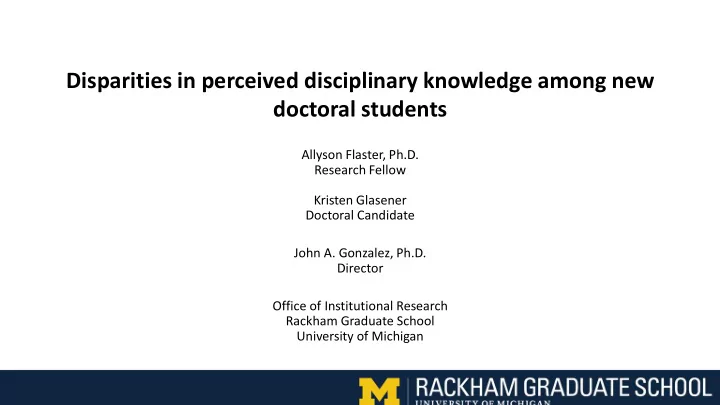

Disparities in perceived disciplinary knowledge among new doctoral students Allyson Flaster, Ph.D. Research Fellow Kristen Glasener Doctoral Candidate John A. Gonzalez, Ph.D. Director Office of Institutional Research Rackham Graduate School University of Michigan
Motivation The goal of doctoral education is to prepare students to become scholars – to ● conduct original research and create new knowledge (Lovitts, 2005). Doctoral student success depends, in large part, on students’ ability to gain ● knowledge about disciplinary content, norms, and practices (Golde, 2005). Doctoral students enter their programs with varying levels of disciplinary knowledge ● and skills, and these initial disparities can compound over time (Feldon, et al., 2016). Despite the importance of knowledge in scholarly development, we know little ● about what factors influence doctoral students’ disciplinary knowledge as they begin their programs.
Research Question What factors influence entering graduate students’ perceptions of possessing the requisite knowledge to be successful in doctoral education?
Conceptual Framework Demographics/ social identities Perceived Academic Anticipatory disciplinary Identity socialization knowledge experiences Content Normative Strategic Academic credentials Pre-PhD Program PhD Program
Data This study uses survey data from the 2017 Michigan Doctoral Experience Study ● [MDES], which was administered to 1,027 students at the University of Michigan (response rate=77%). The survey asks about students’ previous academic experiences, knowledge in their ● discipline, and other psychosocial measures. Survey responses are matched to institutional information on their demographic ● backgrounds and academic records.
Measures Table 1. Disciplinary knowledge items and their sample means Please indicate how true the following statements are at this stage in your program: Sample (1=Not at all true; 2=Slightly true; 3=Moderately true; 4=Very true; 5=Extremely true) Mean Content Knowledge Items I have extensively read the foundational literature in my discipline 2.88 I have a deep understanding of the theories used in my discipline 2.84 Normative Knowledge Items I know the standards in my discipline for good work 3.40 I have a good understanding of how to frame research so that it is appealing to scholars in my discipline 3.02 Strategic Knowledge Items I know the steps I need to take to achieve my academic goals 3.51 I can navigate departmental politics easily 2.73
Measures Table 2. Means of independent variables Demographics and discipline Anticipatory socialization Academic credentials Female 0.58 MA degree 0.42 Undergraduate GPA 3.67 Research experience 0.86 GRE Verbal %tile 74.67 Underrepresented minority 0.20 Low SES 0.15 Professional practice 0.47 GRE Math %tile 76.91 US Citizen or perm. resident 0.64 Presentation experience 0.50 Undergrad THE ranking Discipline Published 0.46 Not in top 200 0.57 Bio & health sciences 0.22 Disciplinary org. membership 0.48 Top 200-51 0.18 Physical sciences 0.50 Type of undergrad institution Top 50 0.26 Social sciences 0.11 Does not award PhD 0.13 Humanities 0.10 Awards PhD 0.56 Professional fields 0.07 Unknown 0.31 Recognition -0.01
Analytic Strategy Regression Factor Analysis analysis • Multiple • Disaggregated imputation by sex, race, • Disciplinary • OLS Regression and class • Survey knowledge weighting • Recognition Missing data Descriptive procedures Analysis
Findings: Descriptive Analysis
Results: Regression Analysis Coef. Demographics/ Female -0.23 ** URM -0.19 † social identities Master’s degree 0.19 * Anticipatory Perceived Research experience 0.28 ** disciplinary socialization Disciplinary org. member 0.12 † knowledge experiences Recognition factor 0.24 *** GRE Verbal Score Quartile First (1-25) Ref. Academic Second (26-50) -0.39 † credentials Third (51-75) -0.50 * Fourth (76-99) -0.77 ***
Discussion & Implications Finding: Sex and race are associated with students’ perceptions of possessing disciplinary knowledge, controlling for other factors. Why? White males are more likely than White females and URM to overestimate their competence in ○ a domain (Bakken, Sheridan, & Carnes, 2003; Bouchey & Harter, 2005; Correll, 2001; Gysler, Brown, & Schubert, 2002; MacPhee, Farro, & Cannetto, 2013). Societal messages about competence related to gender and race/ethnicity can bias individuals’ ○ self-perceptions (Clance & Imes, 1978; Correll, 2001). Implication: Interventions that target inaccurate academic self-conceptions should occur before PhD study begins
Discussion & Implications Finding: Anticipatory socialization experiences had the strongest relationship with students’ knowledge perceptions Implication: Expand access to anticipatory socialization experiences for underrepresented groups Future research: Perceived How do students’ perceptions Academic disciplinary change over time, and how do Identity they affect future outcomes? knowledge
Thank you! Allyson Flaster aflaster@umich.edu @allyson_flaster Kristen Glasener glasener@umich.edu @kkglasener John A. Gonzalez jagonza@umich.edu @johngonzalezIR
Recommend
More recommend